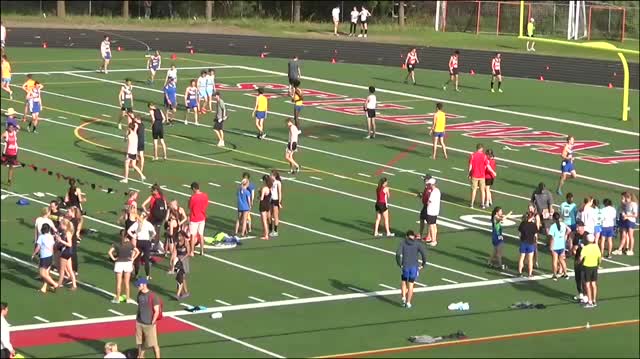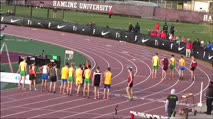
Alumni Focus: Ben Vanderbosch
Ben Vanderbosch is a 2018 graduate of White Bear Lake High School. He now runs at the university of Montana.
o High school PRs: 800m (1:58.42), 1600m (4:17.95), 3200m (9:34.14), and 5000m (15:59.39)
o College PRs: 1500m (4:01.18), and 10000m (32:32.6)
Discuss the transition from high school competition to competing at the college level. What adjustments have you had to make in order to be as successful as possible?
Staying on top of the little things has definitely been the most important thing for me. I go to school really far from home so it's really easy to be lazy and eat like garbage or to stay up late playing video games because no one's there to stop you. I've really had to stay on top of myself to not do those things. Going to the doctor or the athletic trainer when something's bugging me is also something I've had to stay on top of because again, no one's telling me to do these things or making appointments for me. Since everyone is so good in college and especially because I compete against schools like NAU and Southern Utah the little things can be what pushes you over the top.
Tell us about your training regimen by giving a general overview of what goes into getting prepared for your next big event.
Right now, I'm building up my mileage to get ready for summer cross country training. I have a new coach who just came on last fall, so I don't really know what the training is going to look like. I'm guessing from what we've been doing that it's going to be a lot of longer tempos on the slow range of tempo pace which for me is like 5:40-6:00 pace per mile. My coach also loves workouts that give you a really good indicator of what kind of 8k shape you're in and we usually do 2400's with 400's on the ends and you see how many you can do and if you survive a certain number then you're ready to run that pace for a full 8k. Other than that, I'm just going to try to stay consistent with my mileage and smart with my workouts and balance of recovery days to hard days.
What athletic-based goals do you hope to accomplish during this upcoming year?
This year I'm looking to have a really consistently competitive set of seasons because last year I was really slowed down by stupid injuries and sickness and I even had to redshirt indoor track because I was so out of shape from how much time I took off at the end of the cross country season. Time goals are kind of hard because you don't know what courses you're going to be on and what the weather is going to do and those are both really important because a lot of my races for both track and cross country are at altitude. With that being said I'd like to be in the top 30 at conference and the top 50 at regionals which would be considerably higher than I've ran in the past. I'd also like to run in the mid 24:00's for the 8k. For track, I don't really have any goals for indoor because that's not really my focus but in outdoor I'd like to be pretty far under 15:00 in the 5k and around 3:50 for the 1500m.
How has your training and schedule changed because of the current pandemic?
The coronavirus was a big bummer for me because I sat out indoor and I was just getting back into good shape for outdoor. I ran a 4:23 mile on the lane and a half we shoveled on our outdoor track in mid-February and I could tell that I was in considerably better shape when the season got cancelled so it really sucked that I didn't get a chance to show off all my hard work. I've now shifted into cross country training and not a whole lot has really changed except that I'm not really doing workouts and I'm just rebuilding my base. The real cross-country training will start in June.
Do you have any advice that you can offer an incoming freshman on how to best deal with the higher level of competition they'll encounter at the college level? Also, what tips can you provide regarding the balance between training commitments and academic demands?
Definitely go in with an open mind. I think that it was a little easier for me to shift into the higher competition level in college because I wasn't really winning that much in high school. I was good but not a state champion or anything, so I wasn't really used to leading races and being in the front pack. I think it's hard for some people to get used to getting beat and not being able to hang with the top runners and even your teammates. So, just go in knowing that maybe you'll probably not be winning a whole lot and try to remember what it was like when you were a freshman in high school because it's the same process all over again. For me, balancing training and school wasn't all that bad because freshman year your classes aren't really a big deal and for the most part it feels like you're taking a bunch of AP or honors classes from high school. Sophomore year I switched my major from Wildlife Biology to Digital Art so a lot of my work is on a computer and it's stuff that I'm already pretty good at so my homework isn't that hard and when it is I'm learning stuff I'm really interested in so it doesn't feel like a chore. That being said, some of my teammates are in crazy majors like Biochemistry and Neuroscience and they definitely have a lot more commitments than me because labs are three hours long and sometimes even longer and it usually isn't possible to skip. Luckily our coaches, and most likely a lot of coaches, are really good at shifting practices and meeting individually if something doesn't work out. Most schools also have an academic center where you can go study and do homework without being distracted and we're even forced to get in a certain number of hours per week as a freshman. If I had to give one essential tip for balancing out school and everything else, it's to create a calendar. Whether it's online or in a physical planner or something a calendar is super important for managing your day because no one's going to remind you when class is and when homework is due and what day your test is on, so a calendar is definitely essential.
Check out our other 'Alumni Focus' Installments here:




